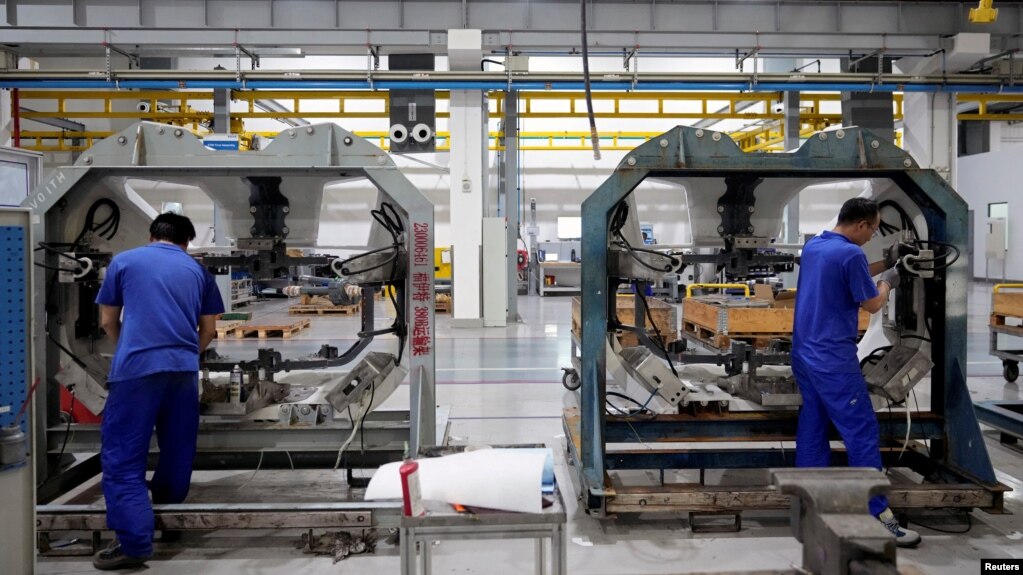
WASHINGTON — The impact of the zero-clearing anti-epidemic policy pursued by the Chinese authorities on the economy is gradually becoming apparent. According to data released by Chinese officials on Wednesday (November 30), China’s manufacturing and service industries continued to shrink in November, the largest since April this year. The new low of 2009 has made the economic outlook that was not optimistic even darker.
China's National Bureau of Statistics reported on Wednesday that China's manufacturing purchasing managers index (PMI) continued to fall in November, falling to 48.0%, below the critical point of 50% for two consecutive months, and also lower than the 49% predicted by economists. It shows that the downward pressure on the manufacturing industry continues to increase.
November's purchasing managers' index was 1.2 percentage points lower than October's, a seven-month low.
A reading below 50 indicates that the industry is in recession, while a reading above 50 indicates expansion.
The non-manufacturing business activity index, which measures activity in the construction and services sectors, was 46.7 percent in November, down two percentage points from 48.7 percent in October and also a seven-month low.
The composite PMI output index in November was 47.1%, 1.9 percentage points lower than in October.
"In November, due to multiple factors such as the repeated spread of the domestic epidemic and the more complex and severe international environment, ... my country's economic prosperity has generally declined," Zhao Qinghe, a senior statistician at the Service Industry Survey Center of the National Bureau of Statistics of China, said at a press conference on Wednesday. above said.
Due to the continuous rebound of the new crown epidemic, Beijing implemented lengthy lockdown measures in many cities in accordance with its general policy of "dynamically clearing" the epidemic, severely impacting people's lives and production activities.
Zhengzhou, the capital of Henan Province, is home to the world's largest iPhone processing plant of Foxconn, a subsidiary of Taiwan's Hon Hai Group. However, the epidemic and lockdown measures have led to workers fleeing and violent conflicts between workers and the police.
Reuters quoted an analysis by economists who pointed out that China's extreme epidemic prevention and control measures have already affected a quarter of China's GDP, and the negative impact on economic growth will continue for most of 2023.
Due to the unpopularity of "dynamic zeroing" and excessive blockade measures, anti-blockade demonstrations have recently erupted in many cities in China, including Shanghai and Beijing. Demonstrators in Shanghai chanted "Xi Jinping step down" and "Communist Party step down," while students at Tsinghua University demonstrated on campus holding blank papers, triggering a silent "blank paper" protest movement.
As the world's second largest economy, China has already encountered difficulties in the continued downturn in the real estate industry and the decline in global demand for Chinese goods, and the soaring epidemic situation has made China's economic development even worse.
The number of new home-grown infections in mainland China eased slightly in the past two days after hitting a record high on Sunday. According to statistics from the National Health and Medical Commission of China, from 00:00 to 24:00 on Tuesday, there were 37,612 new local infections in mainland China, including 4,236 confirmed cases and 33,376 asymptomatic infections.
"As the COVID-19 epidemic continues to worsen, downside risks continue to grow and will seriously affect the economy going into 2023," said Sheana Yue, a China economics researcher at Capital Economics, a London-based economic research firm. It said in a research report released after the data from the Bureau of Statistics came out.
The CSI 300 Chinese blue chips and the Shanghai Composite both closed slightly higher on Wednesday, despite China's manufacturing and services purchasing managers' indexes hitting seven-month lows, likely largely because Beijing is taking steps to boost the economy.
Chinese authorities have introduced a series of measures to boost the economy in November, including loosening monetary policy to save the real estate industry, and formulating the "Twenty Articles" of new anti-epidemic regulations aimed at loosening lockdown measures, in order to implement "optimization" and "Precise", rather than "one size fits all" or "layer by layer" large-scale blockade and control measures



0 Comments